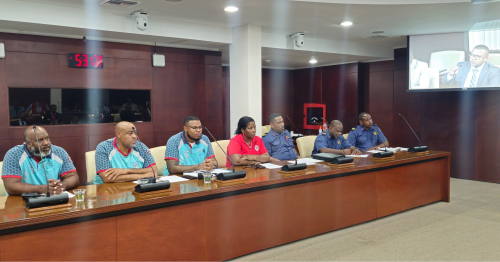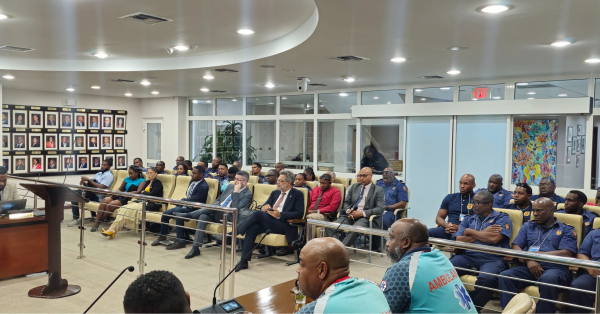 PHILIPSBURG:--- In a fiery and emotional Central Committee meeting, the Fire Department and Ambulance Department of St. Maarten, alongside their union leader Sharon Cannegieter of WICSU-PSU, delivered a blistering account of years of neglect, broken promises, and outright disrespect from the government. The meeting, which stretched late into the evening, was a stark reminder of the systemic failures that have left these essential workers demoralized and fed up.
PHILIPSBURG:--- In a fiery and emotional Central Committee meeting, the Fire Department and Ambulance Department of St. Maarten, alongside their union leader Sharon Cannegieter of WICSU-PSU, delivered a blistering account of years of neglect, broken promises, and outright disrespect from the government. The meeting, which stretched late into the evening, was a stark reminder of the systemic failures that have left these essential workers demoralized and fed up.
"We Are Not Here to Play Politics"
Sharon Cannegieter, the president of WICSU-PSU, did not mince words. "The intimidation is so great within the civil service," she declared, highlighting the toxic environment these workers endure. "Even while they took to the streets today to make their statement of discontent heard throughout the public, using the trucks was a problem. Using the ambulances was not a problem. But the firefighters, again, understood why they were using government trucks for the strike. I didn’t know it was a strike. I thought we were coming to a meeting."
Cannegieter’s frustration was palpable as she called out to the government for its lack of action and respect. "We are tired of submitting proposals. We are tired of asking for meetings. We are tired of having to remind people that they need to meet with people who have their lives in the palm of their hands."
She also lambasted the government for its failure to honor agreements, stating, "This isn’t a story of today. This isn’t a story of a government. This is a story of many governments. This is a story that dates back many years. But it has been that every time persons or the members stand up for their rights, they are then disregarded."
"Touch One, Touch All"
 The workers themselves echoed Cannegieter’s sentiments, painting a grim picture of their working conditions and the lack of respect they face daily. One firefighter, Mr. Chase, passionately stated, "We are the ones dealing with the fire trucks. We’re the ones dealing with the incidents. We will not be responding to bushfires, garbage fires, or non-life-threatening calls. We are tired. No more discussion, no more meeting. Let me see what’s going to happen now."
The workers themselves echoed Cannegieter’s sentiments, painting a grim picture of their working conditions and the lack of respect they face daily. One firefighter, Mr. Chase, passionately stated, "We are the ones dealing with the fire trucks. We’re the ones dealing with the incidents. We will not be responding to bushfires, garbage fires, or non-life-threatening calls. We are tired. No more discussion, no more meeting. Let me see what’s going to happen now."
Another firefighter, Mr. Richardson, highlighted the systemic issues that have plagued the department for years. "We have firefighters that serve for over 38, 40 years. None of their children came to the fire department. You know why? Because all of them told their children, ‘Never. Don’t come to the fire department. Your growth will be hampered.’"
The Ambulance Department shared similar grievances. Mr. Daniel, a veteran of 22 years, expressed his disillusionment: "August 1st made me 22 years [in service]. Not a phone call, not a letter, nothing. Mr. Daniel, thank you for your 22 years of service. Nothing. You think I should continue to come and work, working hard? I only do it because my friends and family tell me, ‘Go out there, do what you love to do.’ But I’m sick and tired of it. We are sick and tired."
"Modern-Day Slavery Exists"
The workers also shed light on the grueling hours and inadequate compensation they endure. Mr. Chase explained the 24-hour shifts they work, breaking down the pay structure: "The first eight hours are paid at 100 percent. The second eight hours are paid at 50 percent. And the last eight hours are paid at 25 percent. So just so you know, the fire of Sucker Garden, where we had to work really hard? That happened in 25 percent. That should show you that modern-day slavery exists."
"A Promise Is a Comfort to a Fool"
The workers’ frustration boiled over as they recounted the government’s repeated failures to deliver on promises. Mr. Eusebios, representing the Ambulance Department, stated, "We are tired of kicking rocks down the road. We're tired of meetings. We’re not having any more meetings with the Council of Ministers. We brought our problems and tributes to them, but what did they do? Look us in our face, laugh at us, give us a paper, run upstairs, give us a paper saying, ‘Okay, can’t have us that, let’s go.’ We ain’t worrying with you no more. Now it’s our turn not to worry with them anymore."
MPs Speak Out
Members of Parliament Lyndon Lewis and Omar Ottley also weighed in, expressing their frustration and solidarity with the workers. MP Lyndon Lewis delivered a powerful statement, reminding everyone of Parliament’s responsibility: "This is the highest body in this country, and nobody can tell me I have zero say. We have the most say in this country because we decide what happens over there at the executive branch. If the executive branch does not do its job, we have a job to do. And the ultimate thing is to have them removed because the people have mandated us to make that decision on their behalf."
Lewis also reflected on his own experience as a civil servant, saying, "There should never be a price tag on life. But to risk your life for the salaries that we earn as emergency workers is disrespectful and without thought for all the tasks that emergency services have to execute."
MP Omar Ottley echoed the sentiment, calling out the government for its lack of action. "What you got today was just a little taste of what we go through on a daily basis, especially me. But I tell you what, once you believe you can look in the mirror and your actions are justified, it doesn’t matter what anyone else thinks. It will never matter what anyone else thinks, because you will never be able to please everyone."
Ottley also highlighted the systemic failures that have led to this crisis: "During the budget of 2024, we put a budget there for a legal to start the process of the ambulance legislation. That was included in the 2024 budget, placed by my person in the previous government. What is the update on such? Has the legislation started?"
The meeting ended with a clear message: the workers are done waiting. They are demanding immediate action, not more empty promises. As Cannegieter put it, "We need to start looking out for our workers. If you have happy workers, you get more work done. But when you demotivate those workers, this is what you get."
The Fire and Ambulance Departments have made it clear: they will no longer be ignored. Their go-slow action will continue until their grievances are addressed, and they receive the respect and support they deserve. The ball is now in the government’s court. Will they finally step up, or will they continue to let down the very people who risk their lives to protect and serve the community?










